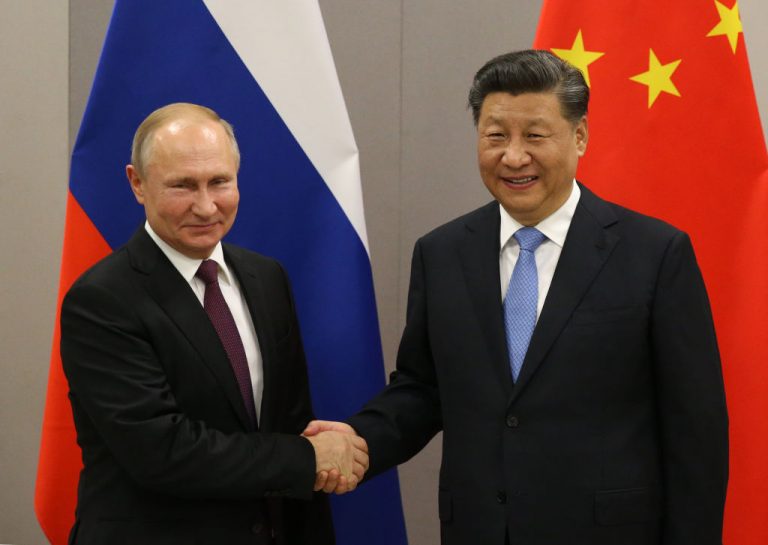With the Winter Olympics scheduled to begin in Beijing tomorrow, Feb. 4, Russian President Vladimir Putin will be meeting with Chinese leader Xi Jinping in their first in-person meeting since 2019.
According to both sides, Friday’s talk will focus on strengthening Moscow’s financial ties with China and coordinating policies in the face of growing pressure from the West. Kremlin aide Yuri Ushakov also said on Feb. 2 that a long-held idea for a new gas pipeline connecting China and Russia through Mongolia will be examined and the two presidents could sign more than 15 agreements.
After the meeting, the two will attend the Games’ opening ceremony.
The Russian president previously criticized “attempts by some countries to politicize sports to the benefit of their ambitions,” an apparent reference to a diplomatic boycott of the Olympics by the U.S. and other Western countries.
READ MORE:
- Champion Snowboarder Calls for a Full-Boycott of the 2022 Beijing Winter Olympics
- Canada and the UK Join American Diplomatic Boycott of the Beijing Winter Olympics
And while American and European officials may be staying away from the Olympic Games due to human rights concerns, Putin is keen to meet with China as tensions soar over the buildup of troops along his country’s border with Ukraine.
Success
You are now signed up for our newsletter
Success
Check your email to complete sign up
Chinese state-run news agency Xinhua quoted Putin as saying that Moscow and Beijing play an “important stabilizing role in global affairs and help make international affairs more equitable and inclusive.”
Putin’s upcoming meeting with Xi and attendance at the opening ceremony “announces the further promotion of the China-Russia relationship,” said Li Xin, director of the Institute of European and Asian Studies at Shanghai’s University of Political Science and Law.
“The U.S. and the Western countries, on the one hand, are exerting pressure against Russia over the issue of Ukraine, and on the other hand, are exerting pressure against China over the issue of Taiwan,” Li added, referring to the self-ruling island and U.S. ally that China claims as its own territory and has vowed to reclaim by any means necessary. “Such acts of extreme pressure by the West will only force China and Russia to further strengthen cooperation.”
Tensions bubble over Ukraine
A buildup of more than 100,000 Russian troops near the border of Ukraine has fueled Western fears that Moscow is preparing to invade its neighbor. Russia has denied planning an offensive but urged the U.S. and its allies to provide a binding pledge that NATO won’t expand into Ukraine and other ex-Soviet nations or deploy troops into the region.
Western nations have threatened a slew of sanctions should Russia make an incursion into Ukrainian territory after Russian gas supplies came under scrutiny, Reuters reported.
READ MORE:
- Russia Looking to Place Pro-Moscow Leadership in Ukraine
- Biden Warns Ukraine of Imminent Russian Invasion, Says CNN
Putin accused the U.S. and its allies last week of “stonewalling Russia’s security demands” but said he would be open to talks with Washington. He argued that NATO’s expansion eastward and a potential offer of membership to Ukraine “undermine Russia’s security and violate international agreements that endorse the indivisibility of security,” a principle which states that the security of one nation shouldn’t be strengthened at the expense of others.
The Russian leader has warned that if the West refuses to heed Russian demands, he could begin ordering “military-technical moves.” Other than a full-fledged invasion of Ukraine, experts have said Putin could consider other escalatory options, including beefing up already extensive military ties with China.
Russia and China have held a series of joint military activities, including naval drills and patrols by long-range bombers over the Sea of Japan and the East China Sea. In August 2021, Russian troops deployed to Chinese territory for joint exercises for the first time.
Even though Moscow and Beijing have rejected the possibility of forging a military alliance in the past, Putin is now saying that the prospect shouldn’t be completely ruled out. He has also noted that Russia has been sharing “highly sensitive military technologies” with China that would help significantly bolster the two nations’ defense capabilities.
Some observers also suggested that Beijing is closely watching how the U.S. and its allies act in the standoff over Ukraine as it ponders further strategy on Taiwan, a self-ruled island that the mainland Chinese regime claims as part of its own territory.














